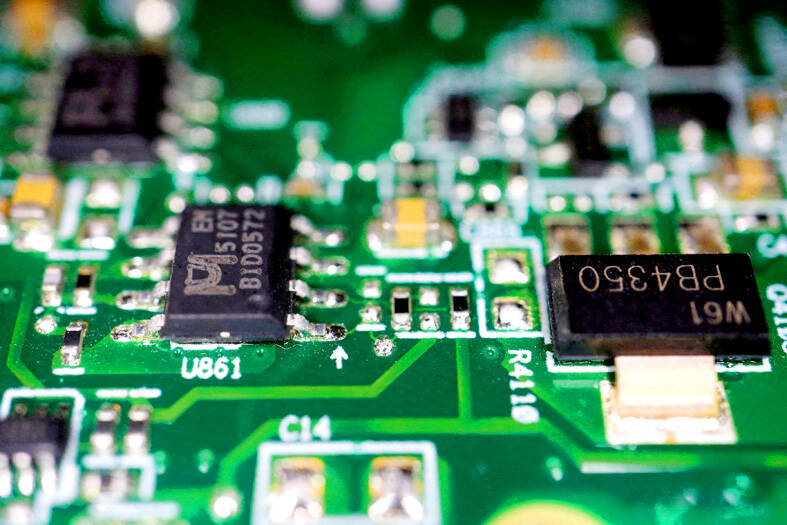Japan has decided to apply foreign trade regulations to chipmaking equipment as part of its efforts to secure stable supply chains, the Japanese Ministry of Finance said yesterday.
Foreign investors are now required to give prior notice when conducting direct investment in equipment tied to chipmaking, including when acquiring a 1 percent or bigger stake in a listed company or buying shares in an unlisted company, the ministry said in a statement.
The move also aims to address the risk of technology leakage and keep commercial technologies from being used for military purposes, it said.

Photo:Florence Lo, Reuters
Other products added to the list of so-called “core business sectors” include advanced electronic components, machine tool components, marine engines, fiber optic cables and multifunctional machines, the ministry said.
With the additions, core business sectors now cover all specified critical products under the nation’s economic security promotion act, the ministry added.
The targeted move would help the government enhance national security while its impact on companies is expected to be limited, a ministry official said.
The move comes as Japan tries to revive its own capacity to produce semiconductors as a pillar of its economic security strategy.
Japan has already earmarked some ¥4 trillion (US$26.9 billion) over the past three years to recharge its semiconductor sectors and promote digitalization. The government is also drafting legislation to further boost investment in chipmaking capacity at home.
With a new semiconductor strategy, Tokyo has aggressively recruited foreign companies such as Taiwan Semiconductor Manufacturing Co (台積電) with hefty subsidies to boost chipmaking at home.
Critics say past efforts failed to revive the sector, because they did not incorporate collaboration with foreign companies.

In Italy’s storied gold-making hubs, jewelers are reworking their designs to trim gold content as they race to blunt the effect of record prices and appeal to shoppers watching their budgets. Gold prices hit a record high on Thursday, surging near US$5,600 an ounce, more than double a year ago as geopolitical concerns and jitters over trade pushed investors toward the safe-haven asset. The rally is putting undue pressure on small artisans as they face mounting demands from customers, including international brands, to produce cheaper items, from signature pieces to wedding rings, according to interviews with four independent jewelers in Italy’s main

Japanese Prime Minister Sanae Takaichi has talked up the benefits of a weaker yen in a campaign speech, adopting a tone at odds with her finance ministry, which has refused to rule out any options to counter excessive foreign exchange volatility. Takaichi later softened her stance, saying she did not have a preference for the yen’s direction. “People say the weak yen is bad right now, but for export industries, it’s a major opportunity,” Takaichi said on Saturday at a rally for Liberal Democratic Party candidate Daishiro Yamagiwa in Kanagawa Prefecture ahead of a snap election on Sunday. “Whether it’s selling food or

CONCERNS: Tech companies investing in AI businesses that purchase their products have raised questions among investors that they are artificially propping up demand Nvidia Corp chief executive officer Jensen Huang (黃仁勳) on Saturday said that the company would be participating in OpenAI’s latest funding round, describing it as potentially “the largest investment we’ve ever made.” “We will invest a great deal of money,” Huang told reporters while visiting Taipei. “I believe in OpenAI. The work that they do is incredible. They’re one of the most consequential companies of our time.” Huang did not say exactly how much Nvidia might contribute, but described the investment as “huge.” “Let Sam announce how much he’s going to raise — it’s for him to decide,” Huang said, referring to OpenAI

The global server market is expected to grow 12.8 percent annually this year, with artificial intelligence (AI) servers projected to account for 16.5 percent, driven by continued investment in AI infrastructure by major cloud service providers (CSPs), market researcher TrendForce Corp (集邦科技) said yesterday. Global AI server shipments this year are expected to increase 28 percent year-on-year to more than 2.7 million units, driven by sustained demand from CSPs and government sovereign cloud projects, TrendForce analyst Frank Kung (龔明德) told the Taipei Times. Demand for GPU-based AI servers, including Nvidia Corp’s GB and Vera Rubin rack systems, is expected to remain high,